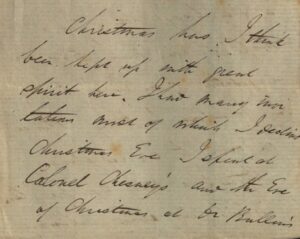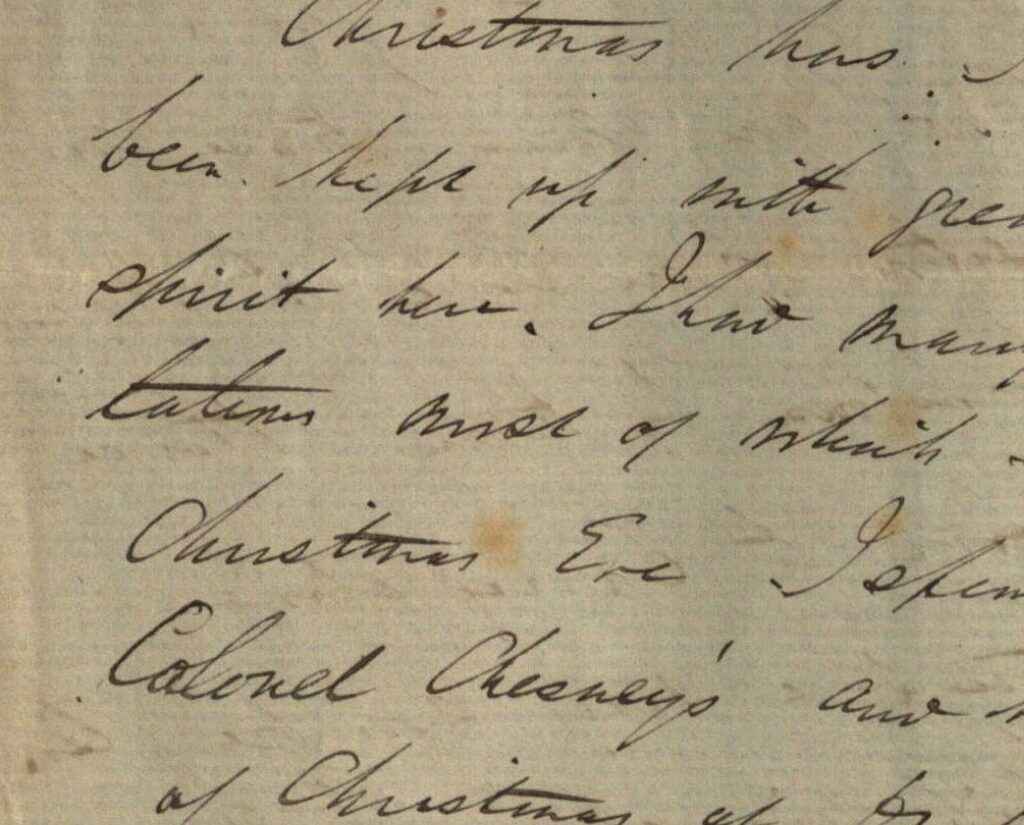
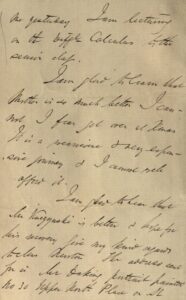
George Boole did not always manage to spend Christmas with family during his time in Cork. Often the College holidays did not allow enough time for the long journey back to Lincoln. Sometimes money was also an issue. In December 1850 both family and money matters are mentioned in letters to his sister Mary Ann. On 2nd December Boole writes that he cannot afford the journey home to Lincoln for Christmas. He writes: “I am glad to learn that mother is so much better. I cannot I fear get over at Xmas.” He states that it is “a very expensive journey.”
He also writes that his brother Charles wrote: “to ask me to lend him some money which of course I shall be very happy to do. But he wished it to come by a cheque from you, and in a fictitious name lest the clerks at the bank should suppose that he was needy. I wrote to tell him that I thought all this was weakness and begged him to write at once and give explicit directions to you or to me what to do. He has written to me, has he to you? PO order would be the simplest way but I am afraid to send it without hearing from him again.”
Family issues continue to concern in a letter from Boole written on the 9th December from Queens College Cork: “I am just now so busy that I have not time to do more than write to tell you that I am well to relieve any anxiety that you might have if you did not get your weekly instalment from Cork. Charles desires that ten pounds may be sent to him from Lincoln in a letter but I really think that it would be dangerous to do so. The money might be lost and there would be no means of recovery. I will therefore send the money by P.O. from Cork. William has written to me telling me of their circumstances. I do not want to advise except advertising – I am very sorry for the whole affair.”
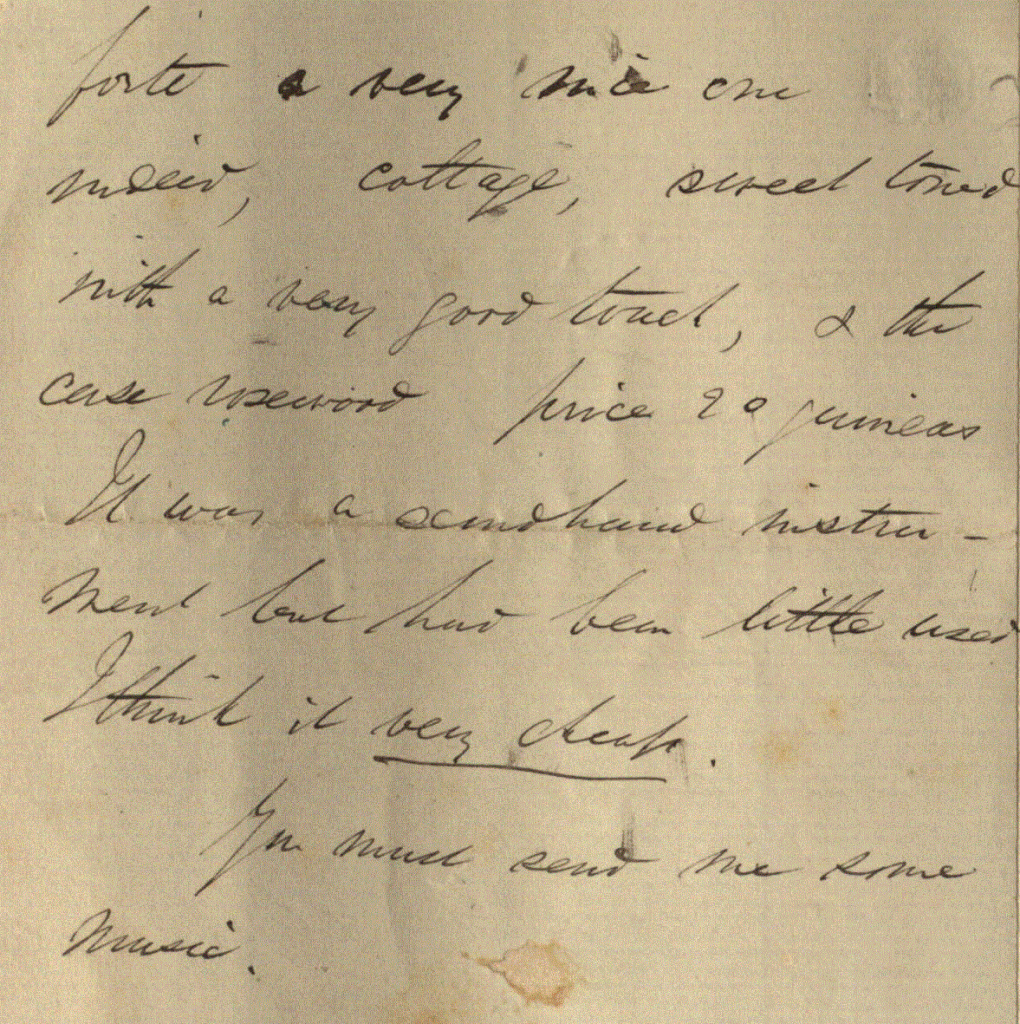
Amusingly, Boole also mentions in a postscript that he has bought a pianoforte: “a very nice one indeed …. the case rosewood price 29 guineas. It was a secondhand instrument that had been little used. I think it very cheap. You must send me some music.”
A more cheerful Boole writes a third letter to Mary Ann on the 31st December where he states that: “Christmas has I think been kept up with great spirit here. I had many invitations most of which I declined. Christmas Eve I spent at Col. Chesney’s and the Eve of Christmas at Dr. Bullen’s.”
(Dr. Denis B. Bullen was Professor of Surgery at Queens College. Colonel Chesney was most probably Francis Rawdon Chesney, a retired British general and explorer, who had command of the Cork District from 1847-1855.
Chesney has been described as the “Father of the Suez Canal”, as he was the first to propose the feasibility of the canal and was recognised as such by Ferdinand de Lesseps, the French Diplomat and eventual developer of the Suez Canal.)
For those who might be tempted to follow in Boole’s footsteps after a Christmas lunch, this third letter also describes a 19 mile walk taken by Boole over the holiday period: “On Saturday I took a very long walk. Get a map and you may trace my expedition from Cork to Passage & Monkstown by train. Hence on foot to Carraigaline through a very sombre glen which lies about halfway between the two places.” Boole describes crossing the river at Carraigaline and walking down to its mouth “through most beautiful scenery” where he notes Drake’s Pool, “from Sir F. Drake having found shelter there when pursued by the Spanish Armada.”
Finally, the Boole papers at UCC Library also includes a brief undated travel journal kept by Mary Ann Boole which contains a description of quite a different Christmas which she spent in Lüneburg, Germany in the employment of a Dr. Blennenthal. Lüneburg is an historic commercial town in Lower Saxony just south of Hamburg.
Mary Ann’s journal describes vividly the importance of Christmas in Germany in a hand that is sometimes difficult to decipher:
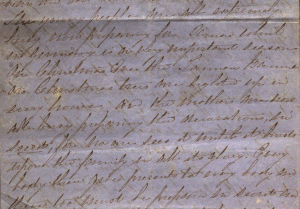
“On Christmas Eve the Tannen Baum or Christmas Trees are lighted [sic] up in every house and the mothers are all kept busy preparing the decorations in secret, for no one sees it until it burst upon the family in all its glory. Every body then gives presents to every body..[sic]”
Mary Ann found the sight so impressive and beautiful she wondered why it was not more widely adopted in back home. Of course, the Tannenbaum is now very much part of our modern seasonal tradition.
